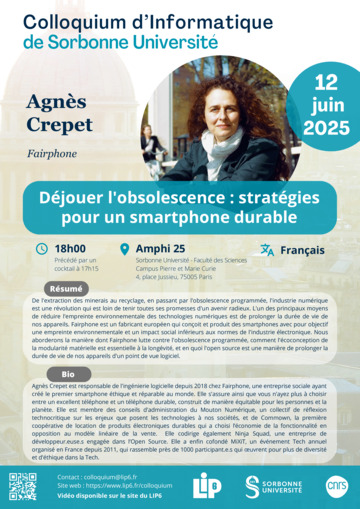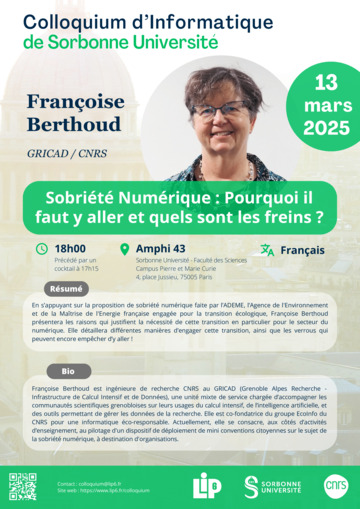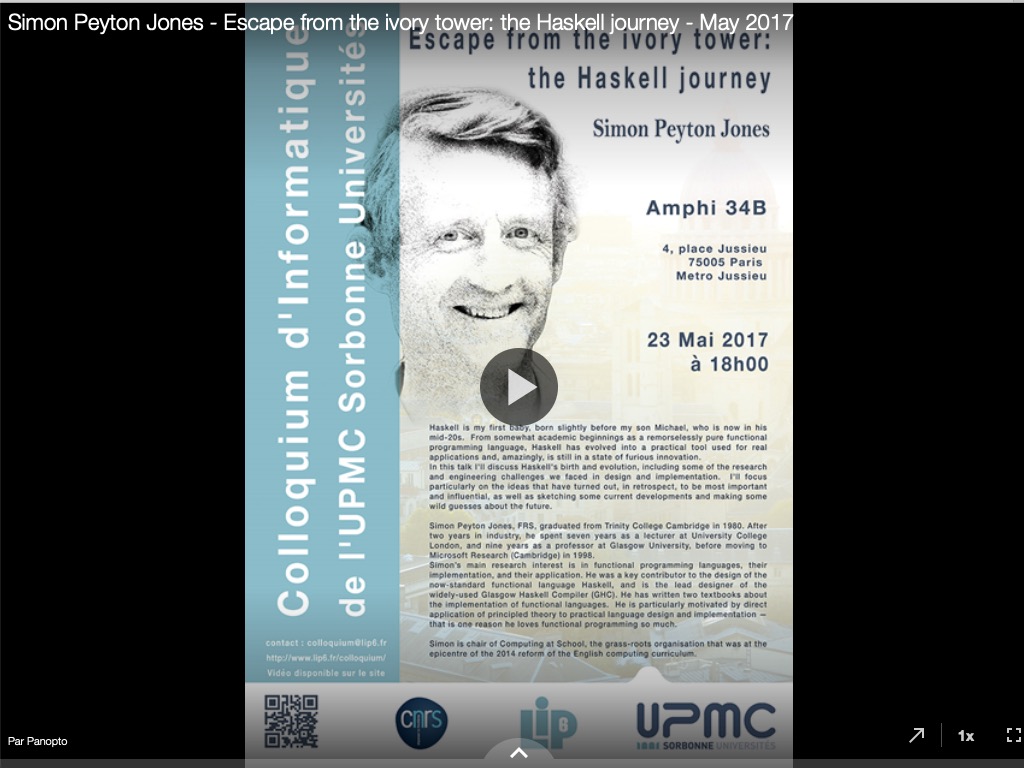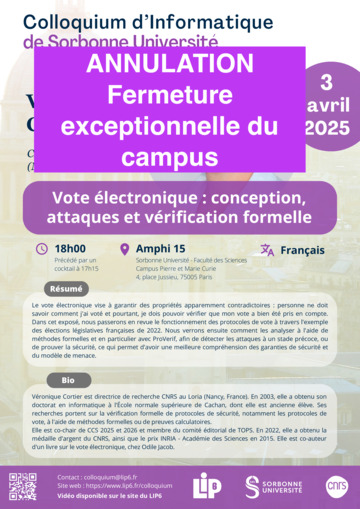Colloquium d’Informatique de Sorbonne Université
Simon Peyton Jones, Microsoft Research
Escape from the ivory tower: the Haskell journey
Simon Peyton Jones, FRS, graduated from Trinity College Cambridge in 1980. After two years in industry, he spent seven years as a lecturer at University College London, and nine years as a professor at Glasgow University, before moving to Microsoft Research (Cambridge) in 1998. Simon's main research interest is in functional programming languages, their implementation, and their application. He was a key contributor to the design of the now-standard functional language Haskell, and is the lead designer of the widely-used Glasgow Haskell Compiler (GHC). He has written two textbooks about the implementation of functional languages. He is particularly motivated by direct application of principled theory to practical language design and implementation - that is one reason he loves functional programming so much. Simon is chair of Computing at School, the grass-roots organisation that was at the epicentre of the 2014 reform of the English computing curriculum.
Haskell is my first baby, born slightly before my son Michael, who is now in his mid-20s. From somewhat academic beginnings as a remorselessly pure functional programming language, Haskell has evolved into a practical tool used for real applications and, amazingly, is still in a state of furious innovation. In this talk I'll discuss Haskell's birth and evolution, including some of the research and engineering challenges we faced in design and implementation. I'll focus particularly on the ideas that have turned out, in retrospect, to be most important and influential, as well as sketching some current developments and making some wild guesses about the future.
Master Class
One particularly popular moment associated to the colloquium is the “Master Class” where students have the opportunity to give a short (but well-prepared) presentation of his/her work. Each presentation (10 minutes) is followed by an open discussion with the guest speaker (15 minutes) who gives a detailed feedback. The complete program is provided here.
About
Launched in 2012, the Colloquium d’Informatique de Sorbonne Université is a recurring event that invites major figures of the computer science field to give special lectures on the campus of Sorbonne University’s Science and Engineering Faculty. It targets a diverse yet technically-informed audience, and especially computer science researchers from all specialities, PhD students, and computer science students at master level.
The Colloquium’s main event is the invited speaker’s lecture, a 45-minute talk followed by questions and interactions with the audience. Generally, this lecture is associated with a masterclass reserved for PhD students from LIP6 and/or other labs.
As the main driving force behind to the steering committee, LIP6 oversees the Colloquium’s organisation, with occasional support from ISIR.
Steering committee
- Jean-Claude Bajard
- Cécile Braunstein
- Pierre-Evariste Dagand
- Binh-Minh Bui-Xuan
- Bertrand Granado
- Marie-Jeanne Lesot
- Nicolas Maudet
- Antoine Miné
- Fanny Pascual
- Nicolas Perrin
- Olivier Schwander
- Laure Soulier
- Julien Tierny
Contact: Julia Lawall
Colloquium announcements
If you do not want to be informed anymore, you can unsubscribe to colloquium announcements
- Year 2025 – 2026
- Year 2024 – 2025
-
 Agnès Crepet
Agnès Crepet
June 12, 2025
Déjouer l'obsolescence : stratégies pour un smartphone durable -
 Françoise Berthoud
Françoise Berthoud
March 13, 2025
Sobriété Numérique : Pourquoi il faut y aller et quels sont les freins ? -
 Sandrine Blazy
Sandrine Blazy
November 26, 2024
Compilation vérifiée : vers du logiciel zéro défaut -
 Hans Bodlaender
Hans Bodlaender
October 10, 2024
Parameterized Algorithms and Complexity Classes
-
- Year 2023 – 2024
-
 Maurice Herlihy
Maurice Herlihy
June 25, 2024
Further Decentralizing Decentralized Finance -
 Jean-Marc Jézéquel
Jean-Marc Jézéquel
April 04, 2024
Comment dompter la variabilité du logiciel ? -
 Claire Mathieu
Claire Mathieu
January 24, 2024
Vehicle routing and approximation algorithms -
 David Bol
David Bol
November 21, 2023
Six of the nine planetary boundaries are transgressed – How we do research in the Anthropocene?
-
- Year 2022 – 2023
- Year 2021 – 2022
- Year 2020 – 2021
- Year 2019 – 2020
- Year 2018 – 2019
-
 Cláudio T. Silva
Cláudio T. Silva
June 11, 2019
Urban Data Science -
 Sébastiano Vigna
Sébastiano Vigna
May 06, 2019
Four degrees of separation (and how we did it) -
 Hugo Gimbert
Hugo Gimbert
March 19, 2019
Les algorithmes de Parcoursup -
 Julie Grollier
Julie Grollier
February 05, 2019
Nanodevices for Bio-inspired Computing -
 Jacques Pitrat
Jacques Pitrat
November 20, 2018
L'IA forte -
 James Larus
James Larus
October 23, 2018
Programming Non-Volatile Memory
-
- Year 2017 – 2018
-
 Eric Horvitz
Eric Horvitz
June 20, 2018
AI Aspirations and Advances -
 Justine Cassell
Justine Cassell
May 15, 2018
Designing Bots, Virtual Humans, and Other Systems that Can Hold up Their End of the Conversation -
 Léon Bottou
Léon Bottou
March 06, 2018
Une approche géométrique de l'apprentissage non supervisé -
 Jean-Luc Schwartz
Jean-Luc Schwartz
January 16, 2018
Modélisation cognitive des unités de la parole -
 Timothy Roscoe
Timothy Roscoe
November 30, 2017
The Trouble with Hardware
-
- Year 2016 – 2017
-
 Simon Peyton Jones
Simon Peyton Jones
May 23, 2017
Escape from the ivory tower: the Haskell journey -
 Maria Chudnovsky
Maria Chudnovsky
April 25, 2017
Induced subgraphs and coloring -
 Philippa Gardner
Philippa Gardner
March 28, 2017
Understanding and Verifying JavaScript Programs -
 Michel Beaudoin-Lafon
Michel Beaudoin-Lafon
February 28, 2017
Interfaces Homme-Machine -
 Marie-Paule Cani
Marie-Paule Cani
November 22, 2016
Modélisation 3D expressive -
 Richard Stallman
Richard Stallman
October 11, 2016
What Makes Digital Inclusion Good Or Bad? -
 Patrick Cousot
Patrick Cousot
September 29, 2016
Abstract interpretation
-
- Year 2015 – 2016
-
 Patrick Flandrin
Patrick Flandrin
June 16, 2016
« Chirps » everywhere -
 Aude Billard
Aude Billard
April 12, 2016
Robots that exceed human capabilities -
 Willy Zwaenepoel
Willy Zwaenepoel
March 22, 2016
Really Big Data -
 Jon Crowcroft
Jon Crowcroft
January 19, 2016
Cybersecurity and network measurement -
 Isabelle Collet
Isabelle Collet
November 24, 2015
Les informaticiennes, de la dominance de classe aux discriminations de sexe -
 Xavier Leroy
Xavier Leroy
October 20, 2015
Desperately seeking software perfection
-
- Year 2014 – 2015
-
 Silvio Micali
Silvio Micali
May 26, 2015
Proofs, Secrets, and Computation -
 Alessandra Carbone
Alessandra Carbone
April 14, 2015
The new era of biology is computational -
 Serge Abiteboul
Serge Abiteboul
February 24, 2015
Toward personal knowledge bases -
 Manuel Silva
Manuel Silva
November 25, 2014
Fluidization of discrete event models or a marriage between the discrete and the continuous -
 Andrew S. Tanenbaum
Andrew S. Tanenbaum
October 28, 2014
MINIX 3: A Reliable and Secure Operating System
-
- Year 2013 – 2014
-
 Donald Knuth
Donald Knuth
June 17, 2014
Computer Science: All Questions Answered -
 Jeannette Wing
Jeannette Wing
May 20, 2014
Toward a Theory of Trust in Networks of Humans and Computers -
 David Patterson
David Patterson
May 06, 2014
Myths about MOOCs and Software Engineering Education -
 Claude Berrou
Claude Berrou
March 25, 2014
L'information mentale -
 Vint Cerf
Vint Cerf
March 04, 2014
On the Preservation of Digital Information -
 C.A.R. (Tony) Hoare
C.A.R. (Tony) Hoare
November 26, 2013
Laws of concurrent system design -
 Gilles Dowek
Gilles Dowek
October 22, 2013
Are formal methods the future of air traffic control?
(Is there an autopilot on board?)
-
- Year 2012 – 2013
-
 Mathieu Feuillet, Camille Couprie, Mathilde Noual
Mathieu Feuillet, Camille Couprie, Mathilde Noual
June 25, 2013
Espoirs : Winners of the 2012 Gilles Kahn prize -
 Robert Sedgwick
Robert Sedgwick
May 23, 2013
Taking Education Online: A Unique Opportunity for the New Millenium -
 Frans Kaashoek
Frans Kaashoek
April 18, 2013
The multicore evolution and operating systems -
 Stuart Russell
Stuart Russell
January 22, 2013
Unifying logic and probability: A “New Dawn” for Artificial Intelligence? -
 Georges Gonthier
Georges Gonthier
November 27, 2012
Le génie mathématique, du théorème des quatre couleurs à la classification des groupes -
 Gérard Berry
Gérard Berry
October 24, 2012
Le temps et les événements en informatique
-
- Year 2011 – 2012













